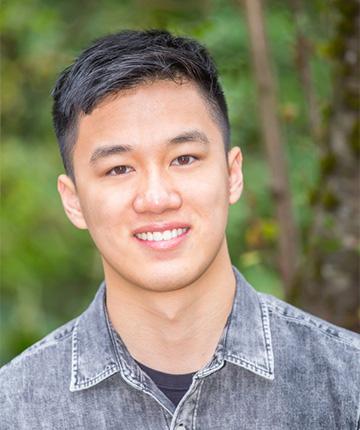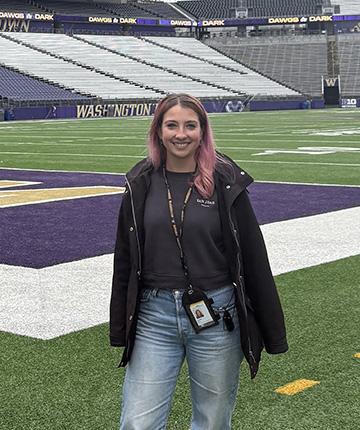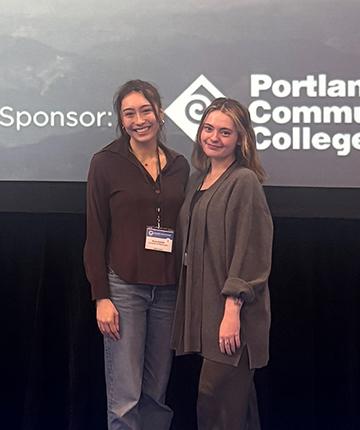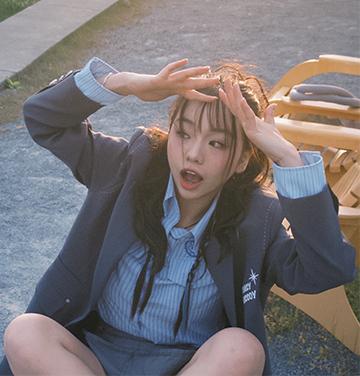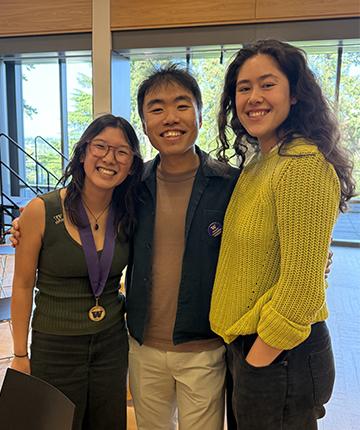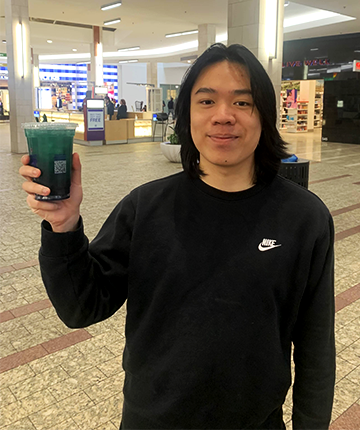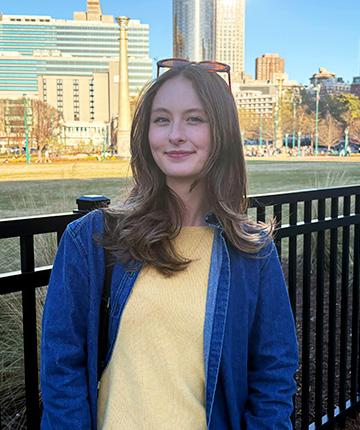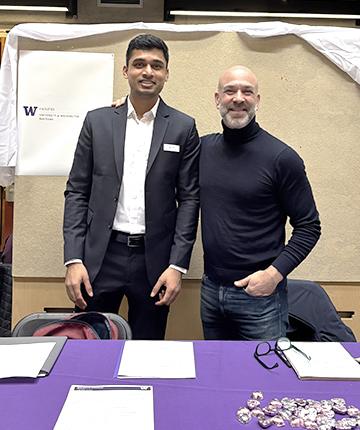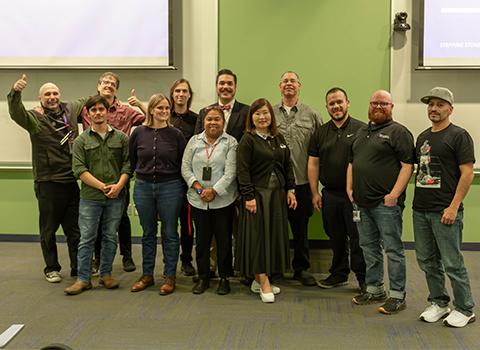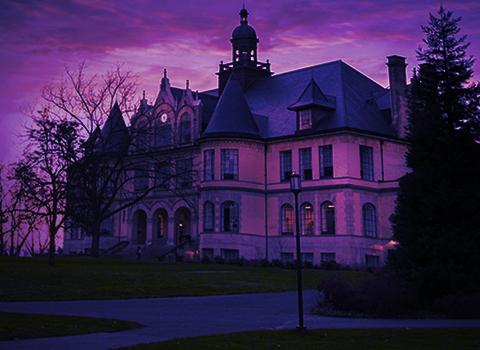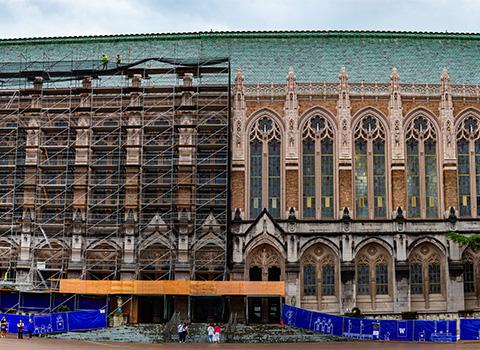Congratulations, 2025 UWF graduates
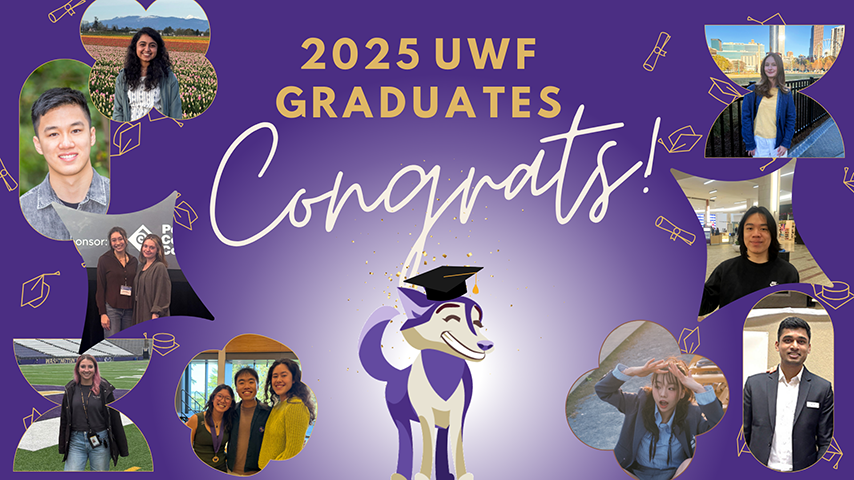
Counterclockwise starting bottom left: Kort Maeda and Boe Zhou (with Tatiana Brown), Camille Zahn, Elena Hamlin and Kellie Telis, Benjamin Han, Shruti Panchal, Tenny Larsen, Minh Nguyen, Udit Kumar G D, Jingying Deng
Student employees and interns are an important part of UW Facilities, helping with day-to-day operations as well as independent projects and outreach. This year's graduating students helped manage UW's property assets, keep campus maps updated, plan student events around sustainability, support employee training, maintain parking pay stations, support student groups applying for sustainability grants, research projects and other support services.
We asked a few of our graduating student employees and interns about their UWF experience. All interviews have been edited for length and clarity.
- Benjamin Han (Engineering Services)
- Camille Zahn (Business Innovation & Technology)
- Elena Hamlin and Kellie Telis (Sustainability)
- Jinying Deng (Safety)
- Kort Maeda and Boe Zhou (Campus Sustainability Fund)
- Minh Nguyen (Transportation Services)
- Shruti Panchal (Transportation Services)
- Tenny Larsen (Partner Resources)
- Udit Kumar G D (Real Estate)
Benjamin Han
Academic program: Graduate, Applied Bioengineering
Where they worked: Engineering Services
Tell me about yourself. Where are you from?
I am from Camas, Washington. I have lived in Washington my whole life, and I wanted to attend a university that was moderately close to home. I have always wanted to study engineering as well, and the first year at UW helped me decide that I wanted to pursue bioengineering in particular. It has been a rewarding and enjoyable four years, and I am excited to be graduating soon alongside the rest of my cohort.
What are you interested in doing for your career?
I plan to continue my study of bioengineering by completing a master’s degree in Applied Bioengineering at the UW. Ultimately, I want to do something related to medical devices, bioinformatics and/or health data science. I feel that this kind of career combines both my passion for engineering and health care as well as my skills in programming and data management.
What did you do in your student position?
My main job is data entry as an intern for UW Engineering Services. I organize data and mark various attributes about building schematics, safety manuals, project proposals and other important documents. While doing so, I have been redefining how these documents are tagged in the comprehensive metadata list. I also have worked on developing algorithms to streamline logging processes, making it easier for engineers to quickly get statistics from CAD drawings.
What has been your favorite part?
I enjoy identifying areas of improvement in systems and collaborating with my supervisor and other engineering professionals on how to address them. I like having the ability to present my ideas to others and designing something that is meaningful and relevant to the goals of the Engineering Services team. I also appreciate the team giving me flexibility in how I do my work and providing me support throughout the job.
How has this job prepared you for what's next?
My job at Engineering Services has taught me fundamental office etiquette and some more advanced Excel skills. It has also given me more experience in professional communication and time management. My algorithm project has also allowed me to explore different techniques in Python programming and task automation. Finally, the position reinforced my interest in data analysis and quality control, which is something that I want to be involved with in the future.
Camille Zahn
Academic program: Undergraduate, Geography
Where they worked at UWF: Business Innovation & Technology
Tell me about yourself. Where are you from?
I have lived in the Seattle area my whole life. I'm from Kirkland, Washington, and I have always wanted to go to UW. I'm super grateful that I got in and was able to come here, both for my degree and to work here as well.
I'm studying geography and data science. I originally applied for informatics, but then unfortunately, I didn't get in. But I do love the program that I ended up going with. Geography is super fun, and I think what I've learned in my degree will be really useful.
What are you interested in doing for your career?
I am interested in staying in GIS, making maps. It's what I love to do. I have two main goals for my career currently. The first one is that I would like to apply GIS to some field or industry that doesn't normally use it, just to kind of see how we can use GIS tools to solve problems in industries that they usually aren’t used in. And then I also want to give back to my community, help people through my work if I'm able to do so. And that's why I'm really grateful that I got this job. I'm glad for the opportunity to give back to UW.
What did you do in your student position?
Most of my job revolves around supporting UW Facilities maps and web mapping applications. This ranges from where all the benches on campus are and where all the bike parking is to super detailed utility maps. For example, we have a really detailed map of all the sewer lines on campus. From every single building on campus, you can track and see where your sewage ends up going to be combined with the rest of Seattle’s waste on its way to the treatment facility. I help maintain all those maps, web applications and the underlying data. Many of our maps were created for and are used by UW Facilities Engineering Services.
And then I also work on the operational technology side, which is all the underlying systems in the buildings that make them work — everything that's controlling the temperature in the buildings, the water flow, the heating, cooling, everything like that. So I get to go down into the mechanical rooms of buildings and troubleshoot meters or devices that are monitoring and tracking utility data.
What has been your favorite part?
I think just being able to get a different point of view on campus. As a student coming here, there's a lot of stuff behind the scenes that you don't really see going on. I had no idea that there were hundreds of people at Facilities just working every day to make sure everything runs smoothly and everything works. So it's been really cool to go behind the scenes, get some campus secrets and learn more about how campus works.
How has this job prepared you for what's next?
In school, there’s a lot of reading and doing assignments that teachers have created for us to learn, but it is a lot different when you go and work in the actual industry and you work on projects using GIS. So I think this job has really allowed me to actually see how GIS is used in practice, rather than just studying it in school. And then I've also just gotten a lot of experience working with clients and stakeholders, trying to figure out how my skills can help other people solve their problems. After this job, I feel a lot more prepared to actually go out into the world and do meaningful work in GIS.
Elena Hamlin and Kellie Telis
Academic program: Undergraduate, Political Economy and International Studies (Elena); Undergraduate, Environmental Studies (Kellie)
Where they worked at UWF: Sustainability
Tell me about yourself. Where are you from?
Elena: I am from Bellevue, Washington, and grew up exploring nature through cross-country road trips and discovering national parks. These experiences instilled in me the importance of conservation and ultimately sparked my passion for climate justice and environmental policy.
Kellie: I am graduating from the UW with a bachelor's degree in Environmental Studies and a minor in Law Societies and Justice! I am originally from Southern California (Orange County to be specific), where I was constantly surrounded by an urban setting. In fact, the first time I really "stepped into nature" was when I moved to Washington in 2021 to pursue my education at the UW. In California, I learned a lot about the effects of societal inequality and marginalized communities, but it was when I moved to Washington that I realized a lot of that stemmed from the pressing climate conversation I was unaware of for so many years.
What are you interested in doing for your career?
Elena: I am deeply interested in the intersection of environment, policy and technology through environmental policy and next-generation technologies. For the near future, I am passionate about deepening my knowledge of community-based solutions for environmental problems to address institutional barriers and implement justice-based policy solutions. Later on, I plan on attending law school to deepen my knowledge of environmental justice, technology policy and community-based resilience through a legal lens.
Kellie: Following graduation, I will be attending law school in order to earn my Juris Doctorate and become an environmental lawyer. The legal system has always been a core interest of mine, and I am excited to use this tool to progress the climate conversation. Environmental law is a very broad field. Although I am unsure the specific field I want to go into as an environmental lawyer, I am leaning towards indigenous law or climate change and energy law.
My ultimate dream is to begin my own nonprofit, compromised of a team of environmental and human rights lawyers who are able to provide legal assistance to marginalized communities affected by climate change.
What did you do in your student position?
Elena: I was able to explore various projects and connect students like myself to impactful sustainability programs. In my role, I helped organize several Huskies for Equitable Sustainability events, such as a Green Jobs Panel, and I project-managed four campus-wide Earth Day events, including a Climate Policy Forum and a Sustainable Cooking Demo.
Another big part of my internship was setting up a foundation for the University's first Student Sustainability Council in collaboration with ASUW, which will center student sustainability efforts and help guide university-wide policy and engagement efforts. The council will be launching this fall, so keep an eye out!
Kellie: My journey with UW Sustainability began in May of 2024 when I began the search for an internship in order to begin my capstone experience within the environmental studies major. I knew that UW Sustainability serves a vital role in our community, whether students are aware of it or not. This made me especially interested in how environmental inequality affects UW students, which is what I formulated my internship around.
The next month, I was ecstatic to see a position centered around student voice and engagement had opened up with UW Sustainability. In my current role, I focus on all things related to collaboration. My role was created just this academic year, meaning it allowed flexibility where we saw fit. Going into this role, I saw the biggest gap in marketing which is what I have focused on in the large part of the last academic year. I ensured we focused hugely on partnerships with student organizations, departments and faculty as they have a much wider network of students who may be newer or desire a deeper understanding to the climate conversation.
For example, Huskies for Equitable Sustainability has been a wonderful way to collaborate with the UW community. While we continue to learn about what students not only want, but need from UW Sustainability, we are learning so much about student perspective and the value it holds.
What has been your favorite part?
Elena: My favorite part of my role is connecting personally with students that join our committees, engage with our events, and push forward new ideas and solutions for intersectional sustainability. It is incredibly inspiring to be able to form new relationships with such passionate, bright students that will eventually transform what sustainability looks like not only locally but also internationally. Without a doubt, connecting with the UW community through outreach and engagement has been the most rewarding part of my experience.
Kellie: This is a super tough question as two things really come to mind! A big moment for me and my future career was being a speaker at the Washington Oregon Higher Education in Sustainability Conference in March 2025. Emily Adams [UW Sustainability’s Sustainability Project and Engagement Specialist], Elena and I presented a research study we conducted about how to best engage students in the overarching topic of sustainability.
But I would have to say my favorite was Friday of Earth Week 2025, when I organized a thrift pop-up and free clothing drive for students in collaboration with Green Greeks. This was the first major event I had organized from the ground up, and it was a huge success! We were able to raise and donate money for environmental nonprofit Front and Centered and to supply hundreds of students with free clothing with the help of UW Recycling and the Career Closet. Additionally, the Campus Sustainability Fund organized two local artists to offer their knowledge, art supplies and warm welcoming to students who could make art on the clothing they had just collected.
How has this job prepared you for what's next?
Elena: This job has taught me many skills, including project management, event programming, strategic planning and community outreach. I am excited to build on these skills and return to the King County Executive Climate Office team as a Climate Equity Engagement Program Specialist. I am excited to deepen my involvement with front-line communities through climate justice initiatives and build a more equitable, sustainable future for all King County residents.
Kellie: Coming into this role, I did not know a thing about marketing and what it meant to form a professional partnership. Working with a team that is as dynamic as they are supportive has been a game changer. I have been able to provide feedback, receive feedback and allow wider audiences to know about the mission and values that we at UW Sustainability center our work around.
Most importantly, this role allowed me to learn about the importance of people in the climate conversation. Climate change affects people disproportionately, from students to minorities to low-income families. In my future career, I will remember the value that collaboration and partnerships within your community holds in challenging times. Furthermore, I will be prepared in leading the formation of these partnerships from now and into the future so that they are not only impactful, but a permanent resource for our community.
Jingying Deng
Academic program: Undergraduate, Business Administration
Where they worked at UWF: Safety
Tell me about yourself. Where are you from?
I am Jingying, I’m originally from China and immigrated to the U.S. in 2017, initially living in Idaho. In 2018, my whole family moved to Seattle because of the stronger educational opportunities — especially since the University of Washington was one of my dream schools. I recently completed my undergraduate degree at UW in just two years and two quarters, thanks to the Running Start program. I majored in Business Administration with concentrations in Marketing, Information Systems, and Operations & Supply Chain Management. Starting in June, I’ll be continuing at the Foster School of Business to pursue my Master of Science in Information Systems.
What are you interested in doing for your career?
With my background in business and information systems, I’m currently aiming for a career as a technical project manager or technical consultant. I’m excited to apply both my business knowledge and technical skills in a role that bridges communication between teams and drives meaningful projects forward.
What did you do in your student position?
My role mainly involves working on website updates. Initially, I was helping build a website, but as the scope shifted, I began updating content based on new documents provided by the team. I’ve also been working in Excel to build reusable templates and developing a new stormwater training course to replace a previous version that was lost due to file issues.
What has been your favorite part?
My favorite part of the internship has been adapting to a real work environment — learning how to collaborate with different roles, communicate clearly and meet deadlines. I also really value the opportunity to learn from others and be part of a supportive team.
How has this job prepared you for what's next?
This position has helped me gain hands-on technical experience and a clearer understanding of what working in a professional, technical environment looks like. Since the role is remote, I’ve also developed strong time management and self-discipline skills, which will definitely help me succeed in future roles.
Kort Maeda and Boe Zhou
Academic program: Undergraduate, double major in Environmental Studies and Design (Kort); Undergraduate, Computer Science (Boe)
Where they worked at UWF: Campus Sustainability Fund, UW Sustainability
Tell me about yourself. Where are you from?
Boe: I am currently graduating as a computer science major with a minor in environmental studies. I moved here for college four years ago. I was born and raised in the city of Nanjing, which is a Chinese city that's not too far away from the industrial areas of China.
In terms of hobbies and interests, more recently I got into different kinds of outdoor sports and just enjoying the view in the Pacific Northwest, because I want to spend more time in nature.
Kort: I moved up here from Southern California. I originally came to UW very interested in environmental justice and environmental policy, so I became an environmental studies major. And then just randomly, I discovered there was a design program, and I've always been very much interested in creativity and art and design. So I got into the design major. I think I've been able to deepen my interest in environmental justice and intersectional sustainability, while also being able to really tap into that creativity and artistic side. A lot of my time at UW I was meshing these two interests.
Similar to Boe, I really enjoy outdoor recreation, being able to have a connection to nature and surrounding environments.
What are you interested in doing for your career?
Boe: What I wanted to do in my future career is investigate how we can make the technologies that are currently being demonized more human for everybody to use and more equitable. The usage of large amounts of data, the usage of AI, the usage of different networking capabilities has not been fully leveraged to serve the communities that are in need.
I know a lot of communities are still working on connecting to the electric grid and internet, but they will have much more potential for development and for prosperity by connecting them to more exciting technologies and leveraging what they're good at to a much bigger platform. Like in Haiti, people are working on how to use a lot of sustainable environmental techniques like composting toilets and solar panels to satisfy their basic needs. There can be a lot more opportunities there just by having the aid of some more modern techniques that can help them better understand their environment and help with their ecological restoration process.
Kort: I did a minor in urban ecological design and really realized that I was very much interested in environmental justice in the built environment. So after graduating, I'm doing a pivot into landscape architecture, and I'm starting my master's degree in the fall. Within landscape architecture, I'm really interested in a lot of the work that Campus Sustainability Fund (CSF) really introduced me to about decolonization within the practices of landscape architecture and how we engage and co-design with communities. I'm interested in working with frontline communities, BIPOC communities, to design spaces that are culturally relevant and based in a history and understanding of a place that also respond to issues of climate change, like sea level rise and climate adaptation.
I'm also very, very interested in exploring data sovereignty and how to ensure that communities, when working with other practitioners or universities or other groups, are able to have autonomy over their knowledge and cultures and data and how that is used within a lot of projects for landscape architecture.
What did you do in your student position?
Boe: My job can be summarized as the whole process of the CSF project timeline. When prospective project teams have project ideas and want to receive support from CSF, I help them navigate the University's landscape, have conversations with them to build those trust-based relationships and figure out what will be the best approach. The next phase is project submission and facilitating the process for writing up the grant application that's going to be reviewed by the CSF committee.
And then after the decision has been made by the CSF committee, it's also my job to communicate and to make sure that all the grants are being spent properly, that people have the proper support from us in terms of implementing the project in the way that they want. The last part is to manage and make sure the projects are successful by having different resources available to them online and to frequently check with them to make sure things are going well and to set up a flexible project amendment structure and a reporting structure for them to both self-reflect on their progress and for us to be updated. Then boost their success and the hurdles they're going through, so we can better strategize within CSF and with our partners on how we can better set up an institutional structure to support them.
Kort: I started my job at the end of my freshman year, and it was called outreach and education coordinator. A lot of it for me in the beginning was connecting with student groups on campus, different RSOs and also different departments, and building relationships and understanding what different groups do and being able to connect that to the work of CSF and sustainability.
But I think over the past three years, it's really shifted. It's been a lot about redefining what sustainability means, pushing it to have interdisciplinary and cultural understanding, and challenging who feels involved in this sustainability movement on campus and in Seattle.
And I think a lot of the day-to-day is using a lot of my design skills and creating graphics or sending out newsletters. Like, right now I'm working on a zine, a little publication for our collaboration with the Q Center, and we're doing a sustainability and trans joy collage project. I’m taking a lot of words and messaging that we want to share with people and bringing it into a form that is easy to read and able to connect with people.
What has been your favorite part?
Boe: A favorite part is definitely working with a lot of people that I would otherwise not be crossing paths with because I came into UW as a computer science student. People always have the stereotypes of the CS student whose only goal is to work for a big tech company in Seattle after graduating college. That was also my mindset.
But then, after working with so many people from different disciplines — people who are making art, studying social science. We have tons of people volunteering for different ecological-related RSOs and organizations on campus. We also have funded water-related projects and I see how passionate people are when it comes to securing our water sources. There are a lot of people, very similar to me who are coming from a very hard science background, who are able to find a direction in making the world more sustainable and making the environment safer for people to live. The amount of information and the different paths I have witnessed really amaze me and have introduced me to this world where you can do very impactful things.
Kort: Echoing Boe here. I think the CSF community and team and the committee — and being able to be around and work around so many like-minded and values-aligned people — has been such a safe place to grow, and learn and unlearn, and figure out what I want to do and how you can fit all your interests into this world of sustainability work. It’s been a good place for me to realize that art and design and creativity and community and the environment all mesh together, and I've been able to bring that to my role.
I also think that working in a very student-driven environment has given me a lot of confidence and autonomy within my work. All of us on our team are so different, like Bo and I have such different interests. Same with everybody else, but we're all able to bring all of our interests in a way that aligns so nice with each other, and we're able to support each other. The people have really made it so special. I will definitely miss our CSF team.
How has this job prepared you for what's next?
Boe: It made me realize how everything is interconnected. In academia, you focus on very scientific problems. You have a very clear problem statement, and you can conduct a lot of experiments on it. You can generate nice results, and you can publish the results to a journal. But then eventually, think about who is going to be impacted and the people who are going to utilize your method in the field. Our professional skills that we were taught in schools are not going to be well aligned with many societal interests that the community members actually care about.
So this work at CSF really has actually introduced me to those disparity and gaps. It is something we cannot ignore, and it is something that's not going to disappear. It makes us realize that all of our work has to be grounded in communities, has to be grounded in each individual person that we are serving.
Kort: I think that CSF has really given me a lot of real world experience of working with so many different people on and off campus and being able to problem solve and also teaching and modeling resilience. I think CSF really shows well that, when you build community and you base your work in the relationships that we have on the UW campus, when new challenges come up, we're still able to rely on different partners or different student groups and support one another. And as we're graduating, being able to build relationships and invest in community is the best that we can do to care for each other.
And I think it's also really shown me that doing justice-centered sustainability can happen in any field or any discipline that we're interested in, and that if we're able to find our niche and the intersection of all our interests and hobbies, we can do the work and have it be meaningful to ourselves and to people around us.
Minh Nguyen
Academic program: Undergraduate, Accounting
Where they worked at UWF: Transportation Services
Tell me about yourself. Where are you from?
I'm originally from Vietnam, but I’ve lived in Washington all my life. Our family owned a business, a small clothing shop, and it was pretty fun working there but we kind of weren't successful at it because our family struggled with money management. That drove me to study business.
What are you interested in doing for your career?
Right now, I'm looking into an accounting position, which is kind of ironic because I'm not an accounting major. With accounting, there are a lot of career paths that you can go into that are not only lucrative, but the work is pretty important. I want to find that kind of meaning in the work that I do.
What did you do in your student position?
Right now, I'm mainly an office assistant, so that's just helping with day-to-day itineraries, creating spreadsheets, delivering parcel work and just doing office management assignments. Right now, I'm doing a database management project creating SQL theories to store inventory asset information. The asset information is pretty all encompassing, whether it's parking spaces, disability stalls, EV parking where you can charge your car — everything that's involved with parking.
And in the past, I've been more of a field supervisor for parking. During football games or tennis matches, I'm generally the person who goes out there and stands in as the immediate manager to remedy customer support — and also just being out there with the staff, making sure they're okay and making sure the equipment is properly functioning.
What has been your favorite part?
Just being able to work with the people here at UW Transportation. In my two years here, I really learned to open up and be able to communicate better. I feel like that's a large part due to the office environment — just how friendly people are.
How has this job prepared you for what's next?
It gave me really invaluable professional work experience, especially the current project that I'm doing right now. Experience in database management is super helpful. A lot of the times, people who go out there to get entry level jobs, they're not going to have experience using MongoDB or writing a proper SQL query to store data.
Shruti Panchal
Academic program: Graduate, Business Analytics
Where they worked at UWF: Transportation Services
Tell me about yourself. Where are you from?
I'm currently a graduate student at the Foster School of Business, part of the Business Analytics Class of 2025. I’m originally from India and moved to the U.S. at 18 for my undergraduate studies. I spent about six to seven years in California studying and working, but eventually felt the need for a change — which led me to pursue my master’s. Seattle still feels like a new city to me, and I’m gradually getting used to its moody blues while learning to truly appreciate the sunshine when it shows up!
What are you interested in doing for your career?
My academic and professional background is rooted in software development and analytics, which is why I chose to pursue a master’s in Business Analytics. I plan to continue building on this foundation as an individual contributor for the next few years. This will allow me to gain exposure to diverse industries, continuously learn, connect with new people, and experience different countries and cultures.
What did you do in your student position?
I'm currently working with the Transportation Services Department. I actually was working in parking assistance earlier, especially during any of the main events that the UW has. This job now is more of like a routine checkup based on all the different parking spots and the pay stations. On a daily basis, I drive a UCAR — a tiny, cute Chevy — around the campus and look at over 30 pay stations. I physically go and check that there's no tampering that has happened to that particular pay station. If things are overall working fine, I just come back, fill out an inspection log and that's that.
What has been your favorite part?
I’ve become much more comfortable driving alone — something that used to feel daunting unless I had someone with me to help navigate. I also used to force myself to wake up early, but now I genuinely look forward to my mornings. I start my day with my on-campus shift, and there’s something truly wholesome about watching the University slowly come to life. I've witnessed the seasons change firsthand, like the cherry blossoms blooming over a beautiful 15-day stretch.
What’s been most special is feeling a sense of belonging in the UW community. Driving through campus, I now recognize familiar faces — people out for early morning dog walks, students starting their day. We smile and cross paths, and it feels quietly meaningful. I don’t think I would have had this experience in any other job, and I’m grateful for it.
How has this job prepared you for what's next?
One thing for sure that I have started to appreciate more is something as simple as observing. Because when you get to drive through the same places every day, you kind of become a part of that place itself. You get to know a lot just by observing. Also, this is not a customer-facing role, and it's a good disconnect that I get in between work as well as studies. It's very meditative. I've worked multiple part-time jobs during my undergrad as well as in my grad school, but I'd say, this is one of those where I enjoy my solitude the most.
Tenny Larsen
Academic program: Undergraduate, Public Health
Where they worked at UWF: Partner Resources
Tell me about yourself. Where are you from?
I'm from Woodinville, Washington, and I've lived here my whole life. My whole family went to UW. We've been big Husky fans my whole life, so my parents were very, very excited for me to go to UW. I'm a public health major. I'm in my fourth year, and I'm really excited to branch out but I'm hoping to stay in the Seattle area for my career, because I love it here so much. My whole family's here: aunts, uncles, cousins, everyone within a 30-mile radius, and we have a huge family.
What are you interested in doing for your career?
I'm really interested in public health policy. Public health is such a broad field. I've narrowed it down that I want to go into either some sort of public health consulting work or work at a nonprofit, consulting on different policy and things like that in the federal and state government. I'm actually going to grad school. I’m going to do my master’s of Public Health and Health Policy at Yale, and I'm super excited.
Hopefully, I'm going to learn a little bit more about the operational side of public health and some of the more specific writing and policy stuff that I'm going to need for my career. I’m hoping to maybe work in D.C. for a little bit too on the East Coast.
What did you do in your student position?
I've worked at UW Facilities in the Training Center for a little over a year now, and at first, I focused half my time on scheduling all the safety training and half my time on Stepping Stones. But more recently, I've just been doing Stepping Stones. I do all the program support for Sarah [Lewis-Assink], who runs the actual program. So that means compiling everyone's schedules together, pairing them for shadowing with different leaders within UW Facilities, I schedule all their resume and interview prep and send out all the reminders and extra resources to all of them. I basically take care of all the logistics and all the little details that would distract Sarah from doing her main job, which is teaching and then supporting the students. I also basically am support staff for the whole Training Center too. The other intern, Sarah, and I set up all the classrooms and help with big events. It's really nice. I love it here so much.
What has been your favorite part?
I think one of my favorite parts was the Summer All-Hands. I got to do a tabling event with Stepping Stones, and I got to sit at one of the tables and be there with two of the current students. We just sat there, and I talked with them all day long about their whole life story, and I learned so much about them. Everyone from the current class and past classes were coming up and saying hi and sharing all their favorite memories of being in the class. And there were new prospective students coming and asking all these questions. That was fun because I got to really spend the day getting to know everyone. Sometimes I'm a little stuck behind the screen when I'm here in the day-to-day doing all the operational stuff. Now when they come in the Training Center, it's so fun because I know all of them pretty well, and they always say hi and stop by.
How has this job prepared you for what's next?
This job has given me so many professional development skills. I was here for the whole first phase of Stepping Stones. The first phase is the lecture-style classes that Sarah gives. I sat in on all of them. So not only was I doing the operations for the program, but I feel like I got to be a part of the program too. I learned about psychological safety and professional communications and managing conflict and all these really useful skills that I feel like I'll take with me in grad school and in my career.
I feel like I've learned how to communicate better with people and work with people who have really different backgrounds than me. No one’s a student here. In my other on-campus jobs, they've all been student-facing and working with other students. So this was an opportunity to work with people who aren't taking classes at the University and who have a lot of life experience outside of college.
I've also really learned what a good working environment is. Sarah and Page [Russell] are awesome supervisors. I could not ask for a better support team. They're so flexible and they make sure that I'm getting exactly what I want out of the internship. I've just learned what good management looks like and how to manage different situations.
Udit Kumar G D
Academic progam: Graduate, Real Estate
Where they worked at UWF: Real Estate
Tell me about yourself. Where are you from?
I'm from Bangalore, India. I did my undergrad in Bangalore in civil engineering and worked there for four years, then decided to learn more about the finance and transaction side of real estate. So I did some research about a few universities in the U.S. and the U.K. but found the Master of Science in Real Estate (MSRE) program here in Seattle to be the better fit for my goals. And apart from academics, I like to do a lot of outdoor activities.
What are you interested in doing for your career?
When I initially planned to come to the U.S., I was interested in doing something in the affordable housing/ multifamily development space. That's still a big interest of mine. But because there's a hiring freeze and the policies have been changing federally, there are not a lot of opportunities right now. So I'm looking at anything that gets my foot in the door in terms of real estate transactions and the finance side of real estate. So that might be asset management, like what I'm doing for the internship program.
What did you do in your student position?
I'm working with the Real Estate team here. Very broadly speaking, we do asset management, and I am involved with office spaces. So it's a lot of reports for the office space that we manage and a lot of strategic meetings that we conduct to figure out what our plan is for the next financial year and how we are allocating the funds for those buildings to be managed efficiently. So right now, I'm working on the asset work plan, which is a report for next year's budget — how are we allocating capital funds for each property that we're managing and what are we going to use those for. And comparing where the reserves are versus how much we're going to spend and giving an overall picture of where we are, what we're going to do. It's like forecasting your plans for those properties.
One interesting part about the internship is that you get to work with a lot of different asset classes, which is not usually the case with typical internships where you're given a particular asset class to manage. Such a big university has lot of different types of assets, like labs, office space, data centers, housing.
What has been your favorite part?
The people here have been amazing. They go out of the way to help students like me get the best out of this experience, especially since this is my first experience in the U.S. working in a professional capacity. So that's been wonderful to learn from these folks about the work culture in the U.S. The culture and approach to work is very different from India. And I'm really grateful that I got this opportunity because they treat it as a student experience. That's been my one of my favorite parts about the internship ֫— the freedom that I get to learn and to get to meet different people through them.
How has this job prepared you for what's next?
This has helped me to be open about different opportunities, because I was very limited in the way I thought I wanted to do certain things. But after I started doing the internship — meeting with a lot of people, talking to them — I realized that there's not just one way to get to where you want. That's definitely been one of the biggest learning experiences for me — to just grasp the idea that there are a lot of possibilities.
And also they've been really, really helpful with connecting me to a lot of different people in different segments. For example, I had an informational interview with someone from Amazon, like a Development Principal at Amazon who was on the financial side of real estate. And I've spoken to so many different varieties of people from all across the asset classes within the Real Estate department. I don't think that would have been possible if I was just a student and not part of this internship.
